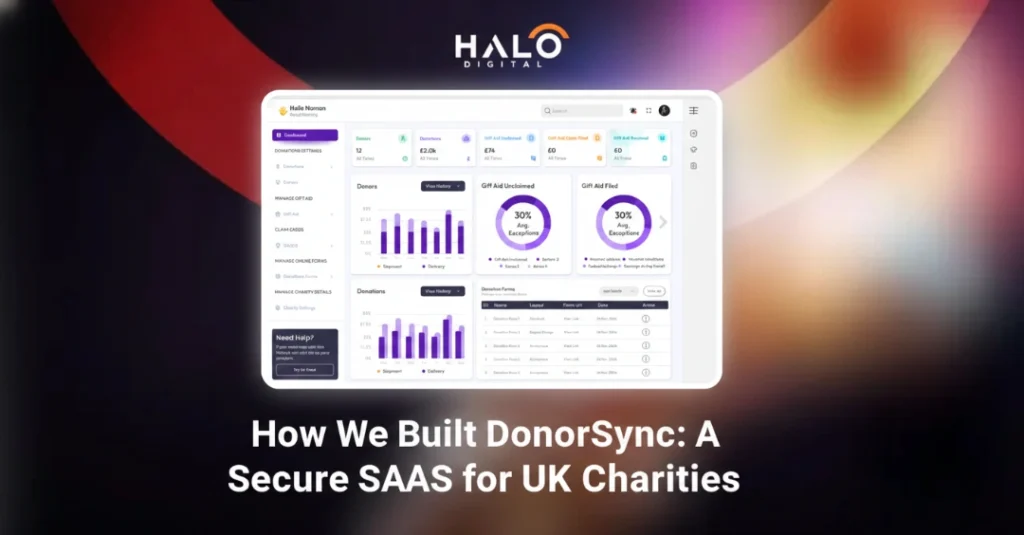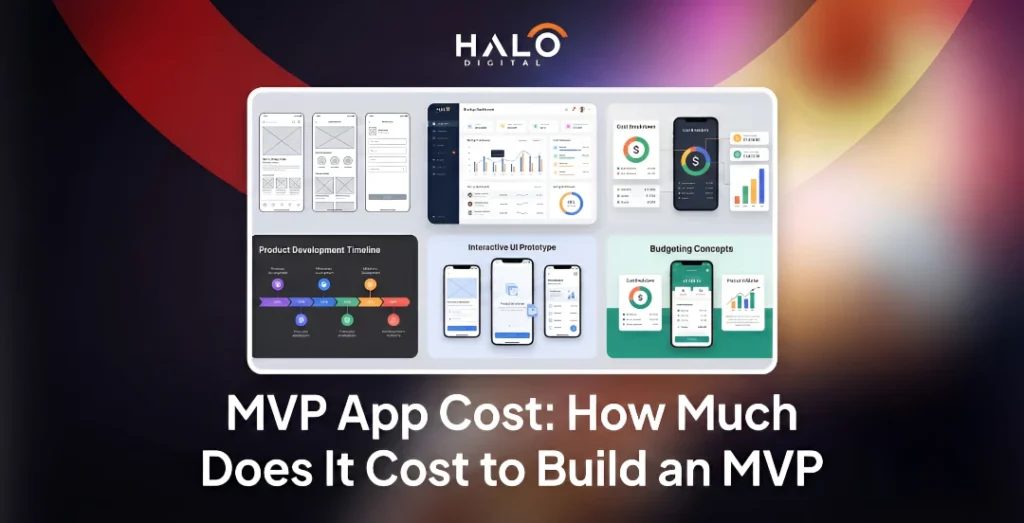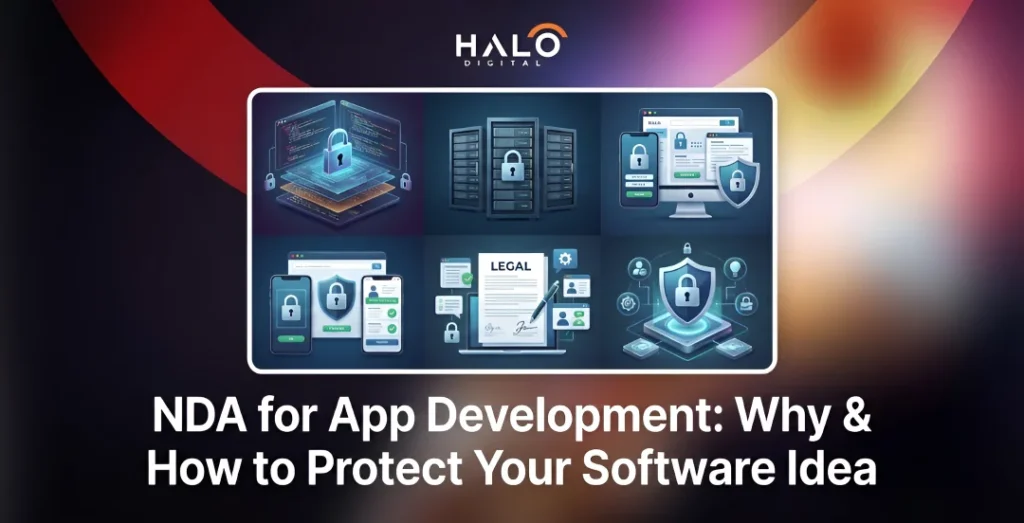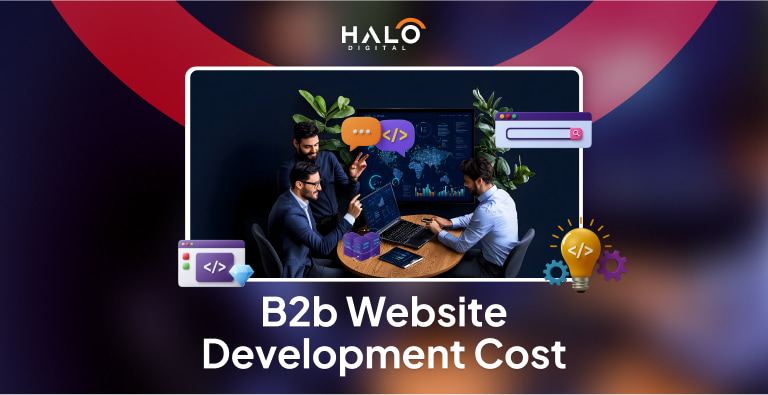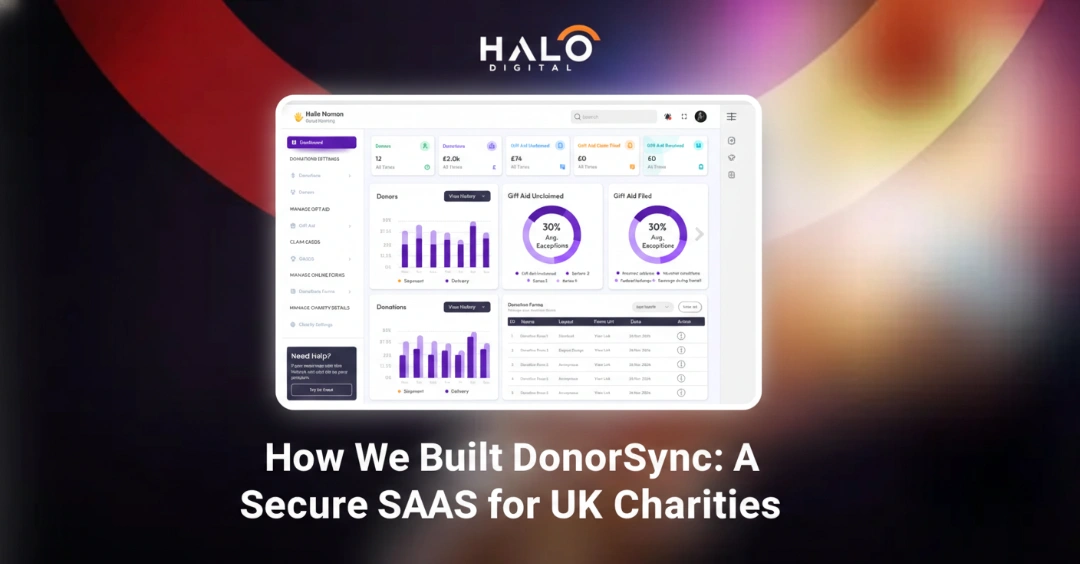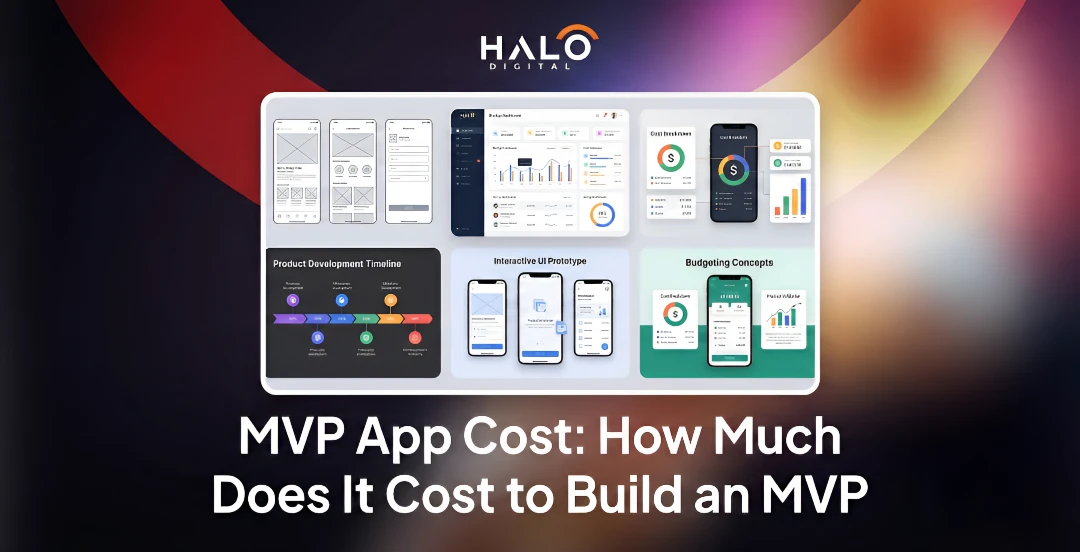In working with B2B companies across industries, I’ve seen how website development goes far beyond design and basic functionality. From integrating CRMs and ERPs to building custom RFQ systems, gated resources, and multi-language support, B2B websites need more planning and investment than standard sites. At Halo Digital, we’ve helped businesses build websites that focus on cost, scalability, and return on investment. This guide draws on that experience to show what drives B2B website costs, how to budget wisely, and why a professional build can turn your site into a powerful growth tool.
B2B web development costs are one of the top aspects to consider when planning an online presence for the first time.
A recent report shows that 75 percent of buyers judge a company’s credibility based on its website design (Stanford University).
Strong design also directly impacts how your content performs online, as explained in our guide on how web design impacts content marketing.
Through my many years of working with B2B firms, I’ve observed how poor budgeting choices can result in unproductive resources and poor-performing websites.
The reality is that B2B websites aren’t like traditional B2C websites. They require sophisticated features and integrations, as well as customized experiences for decision makers. Let’s look at how much a B2B website will cost and the elements that affect the cost.
What Makes B2B Websites Different (and More Expensive)
Websites for B2B serve a different purpose from B2C and personal websites. Instead of focusing on buyers who want to make purchases quickly, B2B websites are designed to facilitate longer buying cycles, more complex decision-making, and the involvement of many stakeholders. The complexity of the process makes the cost of B2B web development more expensive.
In the project I was working on for a client in the manufacturing industry, the website required real-time integration of product data with their ERP system as well as gated content to facilitate lead generation and multi-language support. Each of these increased the cost of an ordinary retail website.
A few unique factors that affect costs include:
- Multiple decision-makers: Websites must provide tailored content for executives, managers, and technical staff.
- Complex integrations: CRMs, ERPs, and third-party APIs often need to be connected.
- Custom workflows: B2B sales cycles require features like RFQ (request for quote) forms and gated resources.
- Stronger security: Sensitive data requires strict compliance with industry standards.
B2B Website Development Cost Breakdown
If clients inquire about how much does a B2B website cost, I tell them that it’s contingent upon several stages of development. Each phase needs its own share in the overall budget. In general, professional B2B web programming projects cost between $30,000 and $150,000, according to their scope.
| Stage | % of Budget | Estimated Cost (Small to Large) | What's Included |
|---|---|---|---|
| Strategy & Discovery | 10-20% | $3,000 - $25,000 | Workshops for stakeholder engagement, market research mapping the buyer's journey Audits of technical quality |
| UX & Design | 15-25% | $5,000 - $35,000 | Wireframes, prototypes, responsive layouts, design systems |
| Development & Functionality | 30-40% | $10,000 - $60,000 | Customized Coding, CMS setup, CRM APIs, integrations, catalogs of products |
| Content Creation & Migration | 10-15% | $3,000 - $20,000 | Writing copy, optimizing SEO transfer of existing content |
| Testing, QA, & Launch | 5-10% | $2,000 - $12,000 | Testing of browsers and speed optimization and bug fixes, as well as staging environments |
| Ongoing Maintenance & Support | Monthly/Annual | $500 - $3,000 per month | Updates Backups, security patches New feature rollouts, updates |
Factors That Influence B2B Website Costs
The cost of a B2B website varies depending on several factors such as size, integrations, and level of customization. I always tell clients that it is better to define needs early because hidden requirements discovered mid-project can double costs.
| Factor | Cost Impact (Range) | Explanation |
|---|---|---|
| Size & Complexity of Website | $10,000 - $80,000+ | Websites that are larger than 100+ pages, content gated to the public and support for the entire world cost more |
| Custom Features vs Templates | $5,000 - $40,000+ | Templates are cost-effective, but customized portals, workflows, or calculators increase cost. |
| Integration Requirements | $5,000 - $50,000 | CRM ERP, payment gateways and API integrations add to the cost of operations |
| Security & Compliance Standards | $3,000 - $20,000 | SSL, GDPR, and HIPAA, as well as industry-specific compliance, can add time to development |
| Agency Location & Team Expertise | $300 - $200/hour | Offshore teams charge less; US/UK agencies with senior experts charge more |
Size & Complexity of Website
The more pages or functions you require, the higher the price. A brochure-style website of 20 pages will be much cheaper than a knowledge hub of 200 pages that includes gated downloads, multi-language support, and portals for clients.
Custom Features in Comparison to Templates
If you are using templates built by the manufacturer, costs remain minimal. In my experience, many B2B businesses require custom calculators, dashboards, and RFQ systems. They can be a significant addition to the costs of B2B website development projects.
Integration Requirements (CRM, ERP, APIs)
B2B customers expect a seamless experience. This requires integrating Salesforce, HubSpot, or ERP systems such as SAP.
Understanding the key components of web-based applications can help businesses plan these integrations more effectively.
I was once on a website where the integration of the CRM was a cost of $15,000 because of the complex workflows.
Security & Compliance Standards
Businesses that handle sensitive data or are in industries with strict regulations have to meet the requirements of compliance. In addition, HIPAA as well as GDPR compliance can increase the initial and ongoing costs.
Agency Location & Team Expertise
Agency firms operating in the US, UK, or Europe are significantly more expensive than teams working offshore. But the higher cost can result in improved communication, better project management, and reliability.
If you’re exploring agency options, our review of the top ecommerce web design companies shows what leading firms bring to the table in terms of expertise and results.
Hidden Costs Businesses Often Overlook
When preparing B2B web programming, many firms overlook other costs that go beyond development. This can lead to overruns in budget if they are not properly accounted for. Here are the factors that influence the cost of B2B website.
Content Updates & SEO Optimisation
SEO isn’t a once-in-a-lifetime job. It requires regular updates to your content and fixes to technical SEO and optimization of keywords. Plan at least $500-$2000 per month to cover SEO as well as content.
Ongoing Security & Compliance Costs
Securing certificates for security, scanning vulnerabilities, and compliance audits require continuous investment. In the absence of these, your company is at risk for fines.
Training & Internal Team Adoption
The best website can fail when your team is unable to make use of it. Documentation and training sessions cost money, but they are crucial to ensure that the website is adopted. For one of my clients, not attending classes meant that sales staff did not update leads properly and resulted in a waste of money on CRM integration.
DIY vs. Hiring an Agency
When companies ask what the cost of a B2B site will be, they typically evaluate freelancers, DIY, and agencies. Each has advantages and disadvantages.
Pros and Cons of DIY Website Development
DIY is less expensive, usually under $5,000, with platforms such as WordPress and Wix. However, B2B sites typically require integrations and scaling, which DIY platforms can’t support.
Working with freelancers
Freelancers can be described as a middle ground that can cost between $10,000 and $40,000, depending on the extent. There is a drawback to their small capacity and the possibility of inconsistent support in the long run.
Full-Service Agency Approach
Agencies can provide the most reliable results beginning at just $30,000. The agencies offer strategy, design development, maintenance, and strategy together. While costly, the cost typically has a higher return on investment.
If you are looking for a trusted partner, Halo Digital’s website development services deliver end-to-end solutions tailored for B2B businesses.
DIY vs Freelancer vs Agency Comparison
| Factor | Cost Impact (Range) | Explanation |
|---|---|---|
| Size & Complexity of Website | $10,000 - $80,000+ | Websites that are larger than 100+ pages, content gated to the public and support for the entire world cost more |
| Custom Features vs Templates | $5,000 - $40,000+ | Templates are cost-effective, but customized portals, workflows, or calculators increase cost. |
| Integration Requirements | $5,000 - $50,000 | CRM ERP, payment gateways and API integrations add to the cost of operations |
| Security & Compliance Standards | $3,000 - $20,000 | SSL, GDPR, and HIPAA, as well as industry-specific compliance, can add time to development |
| Agency Location & Team Expertise | $300 - $200/hour | Offshore teams charge less; US/UK agencies with senior experts charge more |
Halo Digital builds custom B2B websites designed to scale, integrate, and deliver ROI.
Benefits of Investing in a Professional B2B Website
I constantly remind my clients that a good B2B website isn’t just an expense; it’s an investment. It is common to pay for itself in increased conversions as well as long-term savings.
Higher Lead Conversion Rates
A professional site designed to provide a great user experience can increase lead generation. Structured CTAs as well as content with a gated structure and CRM integration can boost conversions.
Applying proven UX rules for B2B web applications further enhances these conversion opportunities.
Improved Brand Authority & Trust
Customers judge your credibility by the appearance of your web page. An updated, professional, secure, and reliable website design makes your business appear as an industry leader.
Long-Term ROI in Comparison to Short-Term Savings
Cheap websites typically need frequent repairs and reconstructions. The investment in quality will reduce costs over the long term.
Better Scalability & Future-Proofing
Websites designed with scalability in mind adapt quickly as your business expands.
Enhanced Security and Compliance
Professional development teams employ solid security, compliance, and regular monitoring to protect your information and reputation.
Challenges and Drawbacks to Consider
Although the advantages of having a professional B2B website are evident, businesses need to consider the risks. My experience with consulting shows that many companies did not consider these disadvantages and ended up extending their budgets and timeframes.
High Upfront Investment
The biggest issue is the initial price. The cost of spending anywhere from $30,000 to $150,000 for websites can be overwhelming, particularly for small-sized businesses. However, a robust B2B website is often a replacement for several marketing and sales tools and makes it a worthwhile investment.
Longer Timelines for Custom Builds
Customized projects require months of development, planning, and testing. While a basic website could take between 2 and 3 months, larger B2B projects can take between 6 and 12 months. Companies that expect quick results frequently underestimate this aspect.
Ongoing Maintenance Commitments
Contrary to a one-time purchase, the website needs to be maintained. Each month, upgrades, hosting security, and SEO optimization must be part of your spending plan. By ignoring this, you risk causing old designs and performance issues.
Dependency on External Agencies or Developers
An agency that hires you can provide expert advice, but it also increases the need for it. If you have a need for changes, and your agency isn’t able to respond, it may delay sales or marketing campaigns. This is the reason why choosing an appropriate partner is crucial.
Integration Complexities
Connecting ERPs, CRMs, or APIs isn’t always easy. Even with well-trained teams, integrations can require additional licenses or modifications that can add cost.
How to Estimate the Right Budget for Your B2B Website
The best method for estimating B2B website development cost is to ensure that the budget is in line with the goals of the business and expectations for ROI.
Setting Business Goals Before Budgeting
Begin with clear objectives. Do you want to boost the number of leads you generate by 30 percent? Enhance SEO visibility? Automate sales processes?
The goals you have should determine the budget and not the reverse.
For practical tips on aligning websites with growth objectives, see our guide on lead marketing strategies in website development.
A client I was working with had a goal to cut down on manual quote requests by half. This meant constructing a complicated RFQ system that increased the budget but yielded tangible outcomes within a matter of months.
Industry Benchmarks for Costing
Looking at industry benchmarks helps set expectations. These ranges match what competitors like Trajectory Web Design and Axon Garside report.
- Small B2B websites (20-40 pages): $30,000 – $50,000
- Mid-sized B2B websites (50-150 pages with integrations): $60,000 – $100,000
- Enterprise B2B websites (150+ pages with complex features): $120,000 – $200,000+
Aligning Budget and Long-Term ROI
It’s appealing to save money early. However, companies that do this tend to spend more in the end. I suggest considering how much you will pay for your equipment for three to five years. By investing in a quality product, you can reduce the requirement for regular repairs and repairs.
FAQs
How much does a small B2B website cost?
A modest B2B website that has 20-30 pages, simple lead forms, and minimal integrations usually costs between $30,000 to $50,000. DIY solutions can lower this, but the majority of professional firms charge within this price range.
What is the average timeline for development?
The average of B2B websites can take anywhere from 4 to 6 months on small-scale builds. More complex projects that require integrations can take up to 12 months. DIY websites can be set up in just a few days; however, they don’t have the sophistication for B2B.
Is ongoing maintenance necessary?
Yes. Regular maintenance is essential to ensure security performance, compliance, and efficiency. The majority of agencies charge between $500 and $3,000 per month based on the level of support. Failure to maintain your system can result in security breaches as well as a stale user experience.
Do integrations significantly increase costs?
Yes. Integrations with ERPs, CRMs, or payment systems could be worth between $5,000 and $50,000, depending on the complexity. Businesses must consider this in their budgets in the beginning.
Conclusion – B2B Website Development Cost
Understanding b2b website development cost is essential for making informed decisions. From strategy to ongoing maintenance, each stage affects your budget and long-term ROI.
The cost of a B2B website may seem high, but the right investment builds trust, generates leads, and supports growth. Think of it not as an expense, but as a strategic asset for the future of your business.

Abdullah Mangi is an SEO strategist and content writer with 5 years of experience helping businesses grow online. He writes about programming, tech, online business, and practical how-to topics. Abdullah has worked with clients in SaaS, software development, web design, link building, yacht rentals, gardening, car rentals, and recruitment.














